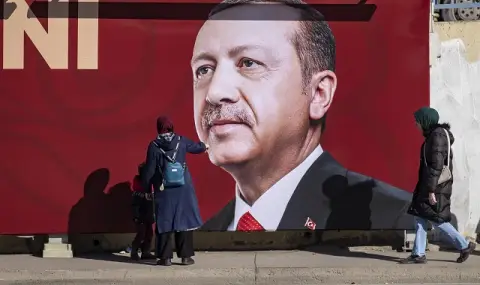The arrest of Istanbul Mayor İmamoğlu once again showed the authoritarian style of the Turkish president. At the same time, Erdogan began his path as a reformer. His policies left a strong mark on Turkey, but also divided it.
The arrest and suspension of Istanbul Mayor Ekrem İmamoğlu has been stirring up Turkey for days now - tens of thousands of people have taken to the streets to protest against President Erdogan. The arrest has also been criticized internationally - the EC, for example, called on Turkey to "respect democratic values".
Experts believe that Turkey has been moving towards autocracy for many years. After the failed coup attempt against Erdogan in 2016, he strengthened the executive power of the presidency and tried to neutralize his opponents and dissenters. Hürcan Asli Aksoy, a Turkey expert at the Science and Politics Foundation in Berlin, told ARD that Imamoglu's arrest was a "step towards full authoritarianism." When Erdogan took office, he declared himself a reformer.
Early years: between football and religion
Recep Erdogan, who was born in 1954, grew up in a poor, religious suburb of Istanbul. As a young man, he worked as a street vendor selling lemonade and pretzels to support his family financially.
His father - a coast guard officer - sends Erdogan to a religious high school, where rhetoric is also studied. His oratorical talent is already impressive there, it is no coincidence that the media calls him the “Nightingale of the Koran“. Erdogan himself claims that in 1981 he graduated from the “Marmara“ University in Istanbul, but the educational institution has had university status only since 1982, as noted on its website. Therefore, for years there has been debate about whether Erdogan actually has a diploma - and it is a condition for holding the presidency.
After that, Erdogan worked in Istanbul's public transport, and in parallel he played football semi-professionally. Since 1978 he has been married to his wife Emine, and they have four children.
His political career began in the 1970s, when he joined the religious-conservative parties led by the Islamist Turkish politician Necmettin Erbakan. In 1994, Erdogan was surprisingly elected mayor of Istanbul, although until then he was almost unknown as a politician. In 1998, however, he was forced to resign from office after being sentenced to prison for a poem interpreted as inciting religious hatred.
Founding the Justice and Development Party (AKP)
After prison, Erdogan, together with other politicians, founded the conservative and right-wing populist AKP party in 2001. Just a year later, the party achieved extraordinary success - it received 35 percent of the vote. Due to his arrest, Erdogan was initially unable to run for prime minister, but in 2003 he took office as a result of legal changes.
From 2003 onwards, he served as prime minister for three terms, achieved economic growth and was even praised as a reformer internationally. Accession negotiations with the EU officially began in 2005, and the process led to Turkey intensively modernizing its laws and regulations. Infrastructure development accelerated, the middle class grew.
However, the Gezi Park protests in 2013 marked a turning point - what began as small demonstrations against a construction project soon transformed into resistance to Erdogan's authoritarian policies and the increasing restrictions on freedom of expression. The government responded with increasing severity, using tear gas, water cannons and rubber bullets. Eight people died and thousands were injured. Erdogan described the protests as a "coup attempt" and used the circumstances to strengthen his power even more.
Relaxing the ban on wearing headscarves
During his more than 20-year rule, Erdogan secured more rights for believing Turks. One example - the headscarf, which had been banned in public since the time of Ataturk. However, his wife Emine constantly appeared with a headscarf, and her two daughters followed because of this ban in the United States. “I am a father who suffers. My two daughters have to complete their higher education abroad because in Turkey they simply cannot practice their own faith“, Erdogan complained to the French media LCI in 2004.
In 2008, Erdogan and his government first allowed headscarves in universities, schools, public services and parliament, and then in the police. Erdogan also pursues a conservative family policy: in his opinion, a woman is first and foremost a mother and should give birth to at least three children.
How Erdogan is expanding his power
Erdogan has been the president of Turkey since 2014 and is making efforts to maximize his power. In 2018, a presidential form of government was introduced, which provided him with broad powers. The head of the executive branch became the president, who until then had more representative functions.
One of the next steps was related to the drastic restriction of press freedom. A number of independent media outlets have been closed or placed under state control, and critical articles have gradually become impossible. Journalists who dare to criticize the government are often intimidated or even arrested.
Pressure on justice
At the same time, arrests of opposition figures have increased. After the failed coup attempt in 2016, thousands of political opponents and academics were detained - mostly on charges of supporting terrorist organizations. The Turkish government blames the coup attempt primarily on the "Gülen" movement, i.e. the supporters of the preacher Fethullah Gülen, who has since died in exile in the United States. Thousands of officials, judges and prosecutors have been dismissed.
For now, one can only guess what exactly the impact of the arrest of Istanbul Mayor İmamoğlu will be - expert Aksoy calls it "a question in a million". But she suggests that Erdogan's calculations may turn out to be correct. "Not necessarily because his approach is well received by voters. But because he can rely on the entire state system - not just the political apparatus, but also the judiciary."
